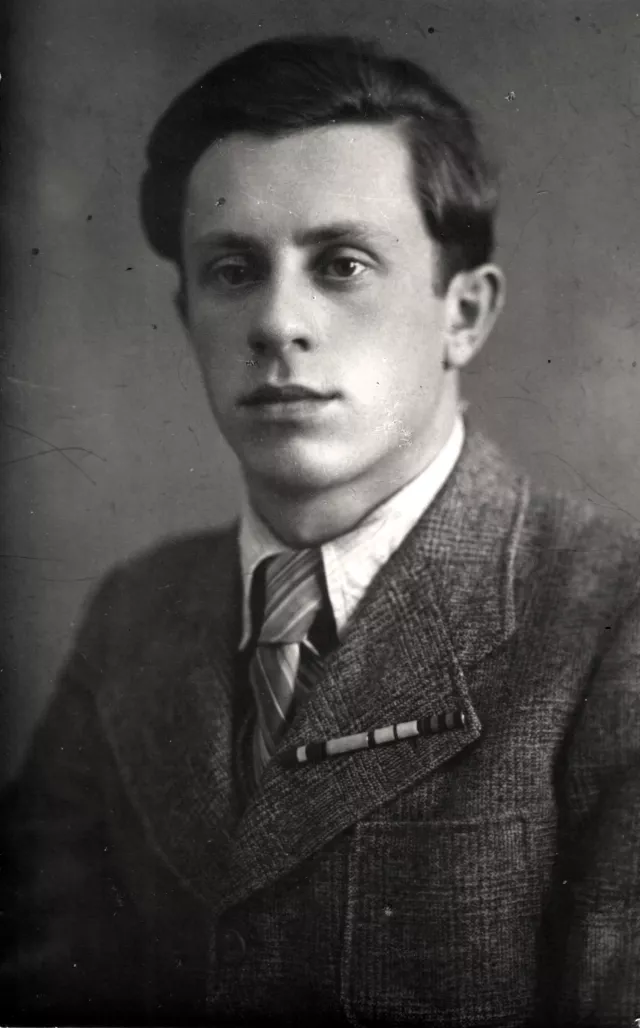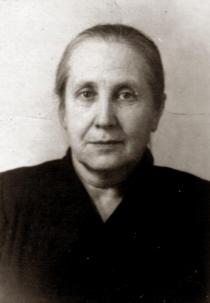Ferdinand Chernovich
This is me before defending my diploma at the institute. I sent this picture to Lvov, to mother's younger sister Ida. She lived in Lvov at that time. The picture was made in Moscow in 1950.
My front-line experience ended in Polish town Belostok. My colleagues, radio-operators and I were on our way to the observation post and I stepped on the mine. I was the only one who suffered from a pin-point blast. My comrades picked me up. Somebody had the car brought and I was taken to the medical battalion. I was on the operation table in 40 minutes. My leg was amputated. I spent couple of days in medical battalion and I was transferred to the army hospital in Tbilisi, Georgia. It took 13 days to get to Tbilisi from Belostok. I had stayed in the hospital for 6 months. I was given a temporary artificial limb and was taught how to walk with an artificial limb.
At the end of February 1945 I was discharged from hospital and on March 1, 1945 I came back to Moscow. In the hospital I was given the status of disabled having the right to work. Pensions for disabled or retired were miserable at that time and it was next to impossible to make a living on them. That is why people worked until they physically could not die by hunger. In Moscow I settled in mother's poky apartment in the basement and began looking for a job. Disabled people had the pension in the amount of 45 rubles per month. It was possible to get by for 3 days on that amount of money. It was impossible to survive without work and I could not be a burden to my mother not only in the household, but also financially. There were not very many men, most of them were in the lines. Soon I managed to find a job as an accountant in small company. My salary was skimpy, but the work was not tiresome, besides I had time to get ready for the entrance exams in the institute.
I had straight excellent marks in my secondary education certificate, and I did not have to take entrance exams, just to go through the interview. It was as easy as pie, and in September, 1945 I became a student of Moscow Institute of High Chemical Technologies named after Lomonosov, the faculty of chemical engineers. Mother insisted on full-time attendance in spite of the fact that my salary made most of our budget. During my studies I received pension for disabled soldiers, which was a little bit increased by that time and a stipend. I was an excellent student during entire period of my studies and I received increased stipend, but it was not much money either. Many students had odd jobs at night unloading cars at freight depots, but I was not capacitated to do that. I was not involved neither in Komsomol nor in social work in the institute. I was deeply immersed in studies.
In 1950 I graduated from the institute. Scientific research and post-graduate studies was my dream, but it was unrealizable for me. Jews were not admitted to post-graduate studies. I was given a mandatory job assignment to the closed plat of ministry of defense, located in the outskirts of the city. I had to agree. The plant was 60 km away from Moscow and I had to take a commuter train to get to the plant. I could not go back and forth every day and I was given a room in the hostel by the plant. I had worked for three years at that plant. My job was very interesting. Besides, I got the opportunity to acquire quite a good qualification. The working conditions were hard for me, because it was difficult for me to walk at that time as I was trying to get used to the artificial leg. The territory of the plant was huge. There was no transport, and the village, where I lived was far from the plant. At that time Saturday was a working day. But we did not work full time, so I managed to visit mother on Sunday.


















